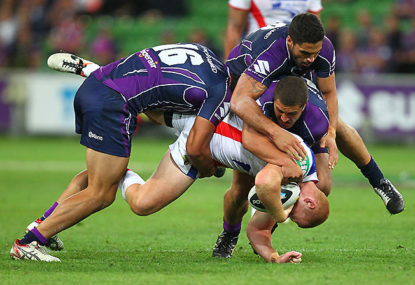Francis Gonzalez
new author
Roar Rookie

The media is the strongest and most powerful tool to influence the masses. In Australia, there is no other professional sporting competition more scrutinised than the National Rugby League.
What people fail to understand is that mainstream media contribute more damage to the game than the players, clubs, officials or administrators put together.
Nearly all positives of the game are overlooked in favour of supposedly more ‘interesting’ stories. Take for instance the NRL’s involvement in Alex McKinnon’s horrific long-term injury.
The NRL offered McKinnon a job for life. Was the coverage positive? No.
The media quickly turned it into a negative by bringing up a case of Simon Dwyer, who has a disabled right arm due to an injury he suffered two years ago.
Obviously it is unfortunate what happened to Simon, but how quick can the media turn a positive into a negative when the NRL’s intentions were always good. It’s almost as if they can’t win.
These are two athletes who have suffered terrible injuries but the media failed the moral ground by using the unfortunate story of Simon Dwyer purely to embarrass the NRL rather than to genuinely raise awareness for his disability.
The media very rarely tells two sides to a story and reports are often only subject to the best interests of the media and journalists in order to to create attention.
In the case of rugby league, the Australian media has focused on nearly every negative aspect of the game to turn them into front page stories.
Over the years, we have seen plenty of incidences in the news where players have been physically or verbally provoked by members of the public, purely to spark a reaction from either the news or the players.
Unfortunately, 90 per cent of the time the players are portrayed as the aggressors before we know the full story.
I know what you’re thinking – the fans also criticise the game in their own accord. Yes, I would agree to that, and criticism of the game is a healthy aspect for any sporting code.
However, one must think who drills excessive negative thoughts into the minds of the public to the point where regurgitate what we hear on television.
Journalists and former rugby league players think their solutions are always right. Not everyone can agree to issues such as referees, player scandals and the NRL in general.
So when no one agrees, you end up with a cycle of negativity where no one can win.
This poisons the mind of the public and is reflected with their opinions of the game.
The modern rugby league fan hates the NRL administration, has little respect for the majority of footy players (due to the media creating a false stereotypes) and has no trust in the competency of the referees.
They may have earned their bad wrap, but you must remember the public get their sources of information delivered to them on a silver platter of negativity.
Observe all major sporting codes from around the world and you will see that the media is not a destructive force to the game like Australian media is to rugby league.
I’m not saying there is no room for criticism for league or that we should call for a complete media censorship on rugby league scandals and issues.
But in order for the game to flourish, the constant negativity of the game in the media needs to be addressed.
Headline stories in rugby league need to be relative to its importance and for the genuine interests of the public.
Yes, the NRL has several issues, but how much of it is blown right out of proportion by the press?